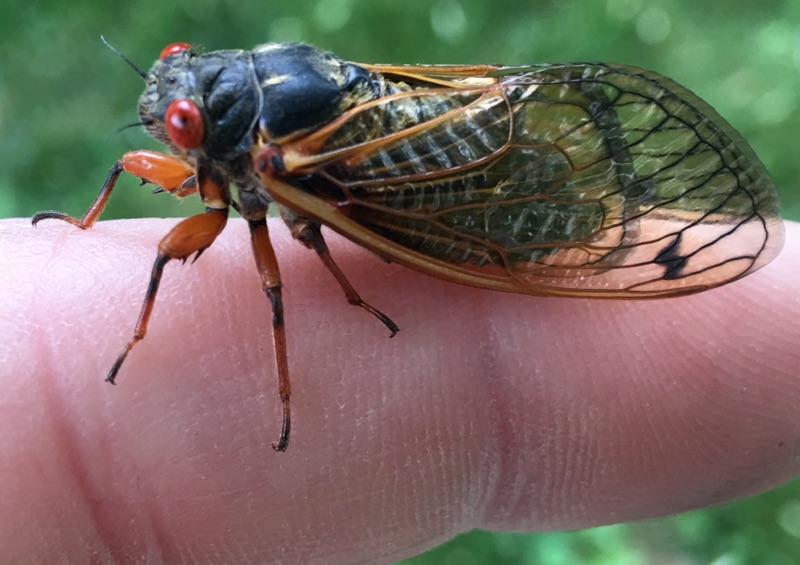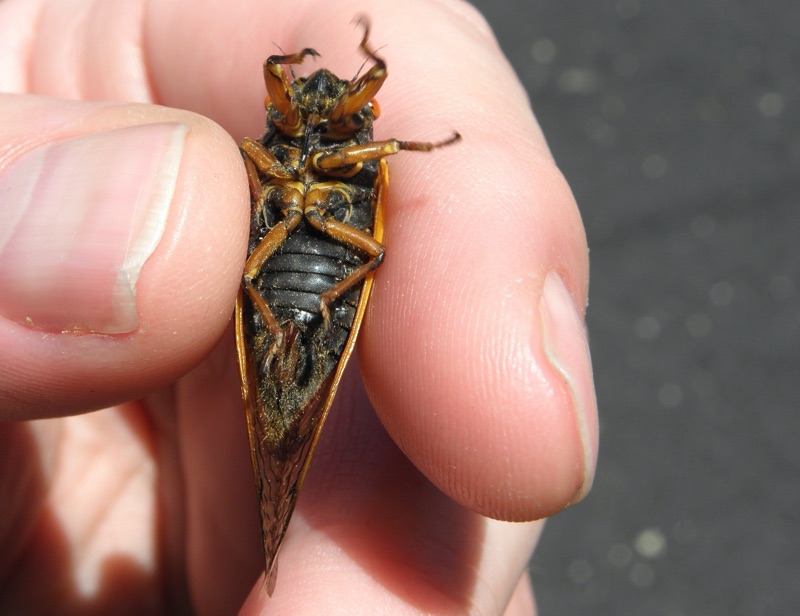Magicicada cassini (Fisher, 1852) aka Cassini 17-Year Cicada.
Update (4/10/2022) David C. Marshall published a paper arguing for the use of the name Magicicada cassini (one i): Marshall, David C. On the spelling of the name of Cassin’s 17-Year Cicada, Magicicada cassini (Fisher, 1852) (Hemiptera: Cicadidae). 2022. Zootaxa 5125 (2): 241–245. https://doi.org/10.11646/zootaxa.5125.2.8


All Magicicada cassinii images & info on cicadamania.com.
M. cassini Court II & III. Recorded in New York, Brood II (2013) by Dan Mozgai.
Source: ©Cicada Mania | Species: M. cassini
Song type: Distress
Source: ©Cicada Mania | Species: M. cassini
Song type: Chorus
Source: ©Cicada Mania | Species: M. cassini
Song type: Call
Source: ©Joe Green | Species: M. cassini
Song type: Chorus
Source: ©Cicada Mania | Species: M. cassini
Video
Video Playlist
Playlists contain multiple videos found on YouTube.
Identification Tips
M. cassinii differs from other Magicicada in that its abdomen is typically all black, with no orange. Exceptions occur in the mid-west, the occasional mosaic pigment mutation. It also lacks the orange coloring between the eye and wing that M. septendecim has. Its chorus sounds like hissing static.
M. cassini Brood Chart
Magicicada cassinii has a 17-year lifecycle.
| Brood | Years | States |
|---|---|---|
| I (1) | 1961, 1978, 1995, 2012, 2029 | TN, VA, WVA |
| II (2) | 1962, 1979, 1996, 2013, 2030 | CT, GA, MD, NC, NJ, NY, OK, PA, VA |
| III (3) | 1963, 1980, 1997, 2014, 2031 | IA, IL, MO |
| IV (4) | 1964, 1981, 1998, 2015, 2032 | IA, KS, MO, NE, OK, TX |
| V (5) | 1965, 1982, 1999, 2016, 2033 | LI NY, western MD, east OH, south-west PA, north-west VA, northern half of WV |
| VIII (8) | 1968, 1985, 2002, 2019, 2026 | OH, PA, WVA and OK |
| IX (9) | 1952, 1969, 1986, 2003, 2020 | NC, VA, WVA |
| X (10) | 1953, 1970, 1987, 2004, 2021 |
DE, GA, IL, IN, KY, MD, MI, NC, NJ, NY, OH, PA, TN, VA, WVA, Washington DC |
| XIII (13) | 1956, 1973, 1990, 2007, 2024 | IA, IL, IN, MI, WI |
| XIV (14) | 1957, 1974, 1991, 2008, 2025 | GA, IN, KY, MA, MD, NC, NJ, NY, OH, PA, TN, VA, WV |
Name, Location and Description
- Cicada Name: Magicicada cassinii (Fisher, 1852)
- Short Name: M. cassinii
- Common Name: Dwarf Periodical Cicada, Cassini Periodical Cicada or 17-Year Cicada
- Synonym/Former Name: Magicicada cassini
- When: May-June. Peak in June. Every 17 years.
- Where it is found: GA, IA, IL, IN, KS, KY, MD, MO, NC, NE, NJ, NY, OH, OK, PA, TN, TX, VA, WI, WV
- Maps: Map
- Description: Black body with orange wings and legs.
- Eye Color: reddish orange
- Pronotal Collar Color: black
- Identification: Bug Guide
- Identification: iNaturalist
- Subject Matter Expert website: Cicadas @ UCONN (formerly Magicicada.org)
- Taxonomic Information: Integrated Taxonomic Information System
- Song: Cicadas @ UCONN (formerly Magicicada.org)
Classification:
Family: Cicadidae
SubFamily: Cicadettinae
Tribe: Lamotialnini
Sub-Tribe: Tryellina
Genus: Magicicada
Species: Magicicada cassinii (Fisher, 1852)
List of sources
- Full Binomial Names: ITIS.gov
- Common names: BugGuide.net; The Songs of Insects by Lang Elliott and Wil Herschberger; personal memory.
- Locations: Cicadas @ UCONN (formerly Magicicada.org)
- Descriptions, Colors: personal observations from specimens or photos from many sources. Descriptions are not perfect, but may be helpful.
- Tribe information comes from: MARSHALL, DAVID C. et al.A molecular phylogeny of the cicadas (Hemiptera: Cicadidae) with a review of tribe and subfamily classification.Zootaxa, [S.l.], v. 4424, n. 1, p. 1—64, may 2018. ISSN 1175-5334. Available at: https://www.biotaxa.org/Zootaxa/article/view/zootaxa.4424.1.1
Notes:
- Some descriptions are based on aged specimens which have lost some or a lot of their color.
4 replies on “Magicicada cassini (Fisher, 1852) aka Cassin 17-Year Cicada”
Was this cicada actually named after John Cassin or after french astronom family Cassini?
I believe it was John Cassin.
These Black with orange eyes varieties seem to be less nosy and slower in flight than some of the greener species. This year is the first I’ve noticed them. Id these are Cassinis, then their big brood time isn’t until next year.
I meant noisy, not nosy! Ha.